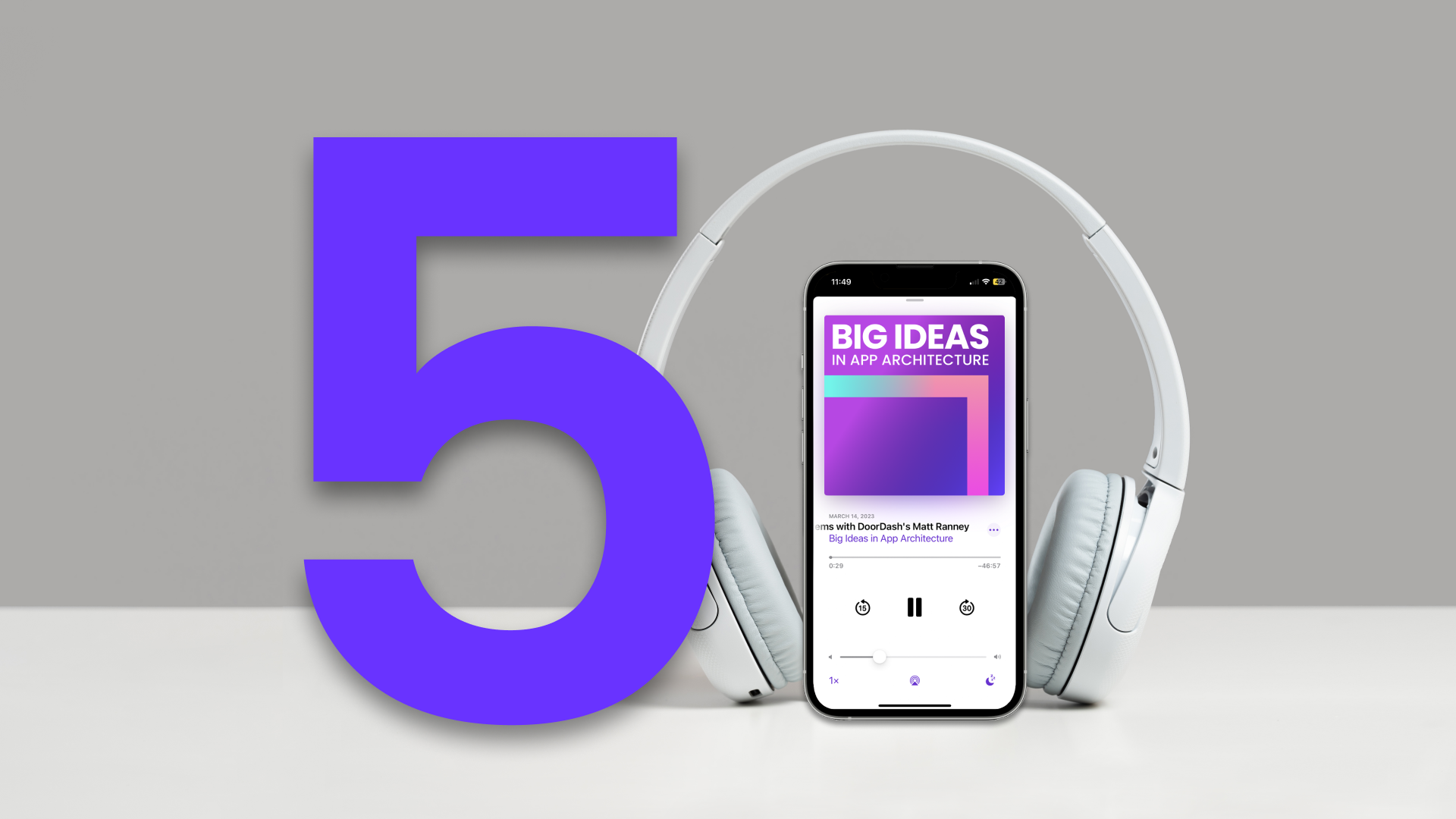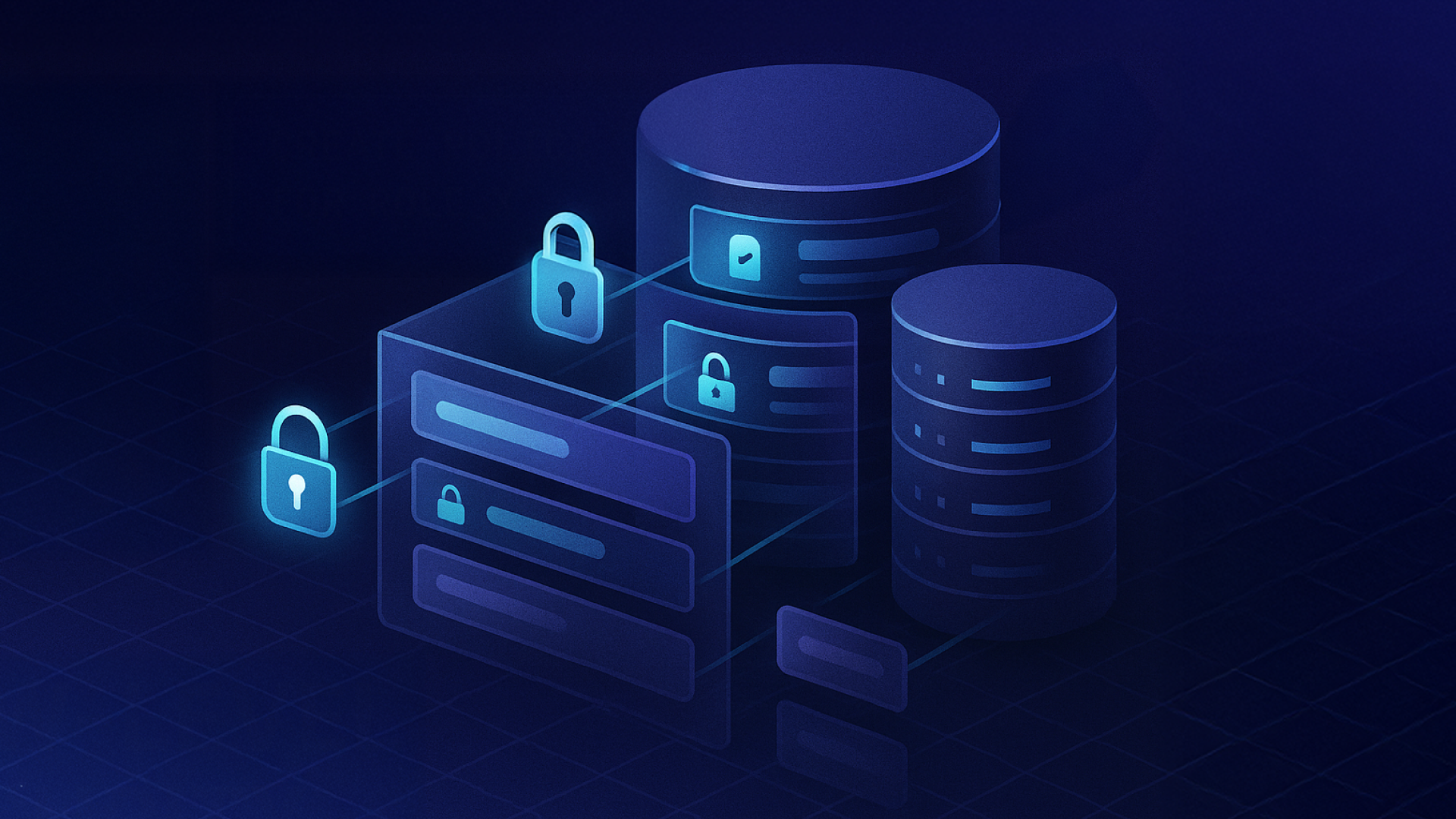Each week, listeners can tune into Big Ideas in App Architecture, our podcast for architects and engineers who are building modern, data-intensive applications and systems. We recently celebrated our 50th podcast episode, featuring Dom Scandinaro, the CTO of Cameo. Over the last eighteen months, we have had the honor of hosting many industry leaders, who have each shared new and exciting ideas, trend predictions, and innovative solutions to different problems.
It’s about real conversations with the people who’ve been in the trenches, solving the toughest challenges in app design and architecture. I’ve had the privilege of learning alongside my audience, exploring new frontiers in tech, and translating those insights into practical strategies that inspire real change. It’s more than just ideas—it's about empowering others with stories of hard-earned success, making innovation feel attainable and actionable for everyone.
— David Joy, Senior Sales Engineering Manager at Cockroach Labs and host of Big Ideas in App Architecture
To honor the 50th episode release, and all the guests who have shared their insights and experiences with us along the way, we’re looking back at 12 of our most popular episodes spanning topics like navigating industry changes, building efficient engineering organizations, tackling the new world of AI, and building reliable, distributed systems. Cheers to 50 wonderful episodes, and many more to come. To get notifications for new episodes, subscribe to Big Ideas in App Architecture today!
How tech leaders navigate industry changes
Staying ahead of the market with Confluent
As the Head of Technology Strategy at Confluent, Andrew Sellers focuses on looking not just at the immediate horizon, but trying to understand where the team should aim to be in 3-5 years, and creating a lot of thought leadership. Throughout the conversation, Andrew shares his views on how Silicon Valley has changed, how real-time data streaming has become key to massive businesses over the last 15 years, and much more. Andrew credits some of his success to a unique career path, which has included a PhD in Computer Science and working in tech leadership roles at QOMPLX, a cybersecurity startup, and the United States Air Force. As Confluent manages a premier data streaming platform, and given Andrew’s prior work in AI research, he’s excited to work during this inflection point.
True to his pillar of thought leadership, Andrew had this to say on AI: “let me take a crack at something and I sure might be wrong…there was a lot of hype around we're going to build the LLM to rule them all…rather than one big winner, I think we're going to get better at specialization and training and making these things work better and faster.”
Listen now: “How to leverage real-time data processing for enterprises”
From millions to billions of events per day at Red Ventures
Majid Fatemian sat down with us earlier this year and shared his hard-won perspectives from 20+ years in the industry, from working on Ubisoft games like Far Cry 2 and Assassin’s Creed to his current work on the Data Platform team at Red Ventures, the parent company of brands like Lonely Planet and the Points Guy. From Majid's perspective, the people aspect of innovation is often more challenging than the technical aspects: “Why should I get into this new tool or new system because the way that I had things was working?...What’s the value add for the business?” As an engineer you can always learn the new tools, but the tool needs to fit the problem and the solution. Looking ahead, Majid predicts that data will become critical to every role—so he believes building a working knowledge of SQL and data modeling is a responsibility everyone shares.
Listen now: "Scaling for 2 billion events per day with Principal Software Engineer at Red Ventures"
Two decades of programming: looking back and looking ahead with Spark Labs’ CTO
Before Mike Willbanks became CTO of Sparks Labs, he was already a lifelong tinkerer, engaging in the early computer era. When his father brought home his first laptop, Mike intuitively understood how the machines worked. Over the last few decades, Mike has learned how to make each iteration of technology work for his use cases. In this packed episode, Mike shared his views on why the serverless paradigm has become so successful, as well as his thoughts on new AI tools. Mike considers current tools like ChatGPT and Copilot as helpful for accelerating certain tasks, but urges people to think critically about how we are utilizing AI: “We have all this data and we can make sense of it in so many different ways, but even with generative AI, if we don’t ask it the right questions, we’re never going to know reasonable answers.”
Listen now: “A historical journey in developer technologies”
What’s at the core of an efficient engineering organization?
Leading an effective engineering team in eCommerce with joy
Like many of the leaders that David has interviewed for the podcast, Meg Adams has already built a storied, albeit non-linear, career. From special education teacher, to retail sales manager, Meg knew early on that she wanted to lead people. Meg got her start in tech with frontend engineering at Condé Nast before pivoting to data engineering management at Etsy, and now serves as the Executive Director of Platform Engineering at the Estée Lauder Companies. Meg radiates joy, and it is central to her role as leader and mentor: “I deeply believe that work can be a joyful and contributing part of people’s lives. And so, I have always just been attuned to that vision and looking out for ways that I could lean into that…where we [can] do really hard things together.” Given how eCommerce businesses have always had to scale with holidays, Meg and her teams have to build resilient infrastructures to withstand the massive spikes in traffic that have become less predictable with the modern-day “TikTok effect.” Meg shares how the engineers she has mentored have benefited from communicating ideas through writing.
Listen now: “How Estée Lauder scales strong engineering culture”
Building a foundation to enable 10x engineers with Amplitude’s SVP of Engineering
“A 10x engineer is somebody who basically understands the customer, makes the right trade-offs…Engineers own the product experience. Just that ownership that I’m not just building to the spec. ‘I have an opinion’—that’s a very, very important part of our culture.” said Shadi Rostami, SVP of Engineering at Amplitude. Shadi’s incredible growth-centric philosophy motivated her to seek opportunities where she could learn from different kinds of peers throughout her impressive career, which included over a decade at Palo Alto Networks and seeing Amplitude’s beginnings as a small startup with an engineering department of fewer than 50 people, all the way through their IPO to present. Shadi joined Amplitude initially because she realized her passion was really in creating value for the customer—a key focus for Amplitude’s product analytics solutions. To learn more about Shadi’s leadership philosophy, thoughts on product-led growth, and the cloud, check out the full episode below.
Listen now: “Enabling a data-driven and innovative engineering culture at Amplitude”
A culture of ownership and innovation that underpins a billion-dollar restaurant franchise
When Brian Chambers took a part-time job at a local Chick-fil-A while attending college, he had no idea that was the start of a 20-year career at Chick-fil-A Corporate. Brian fondly recalls starting his first job out of college at Chick-fil-A in IT, when he actually had to call an operator to get each franchise’s daily data dispatch. Since Brian started, the company has grown from $1 billion in sales to over $19 billion as of a few years ago. Today, Brian is now the Chief Architect at Chick-fil-A Corporate. With all of the growth, Brian has seen tech become a critical part of every aspect of the business, from maintaining customer relationships to connecting kitchen equipment. For Brian, the company’s success “starts with the model that Chick-fil-A uses, we call it ‘Local ownership of a meaningful brand.’” Ownership not only underpins the physical locations but also the openness with which the engineering organization approaches innovation: ideas can come from anyone and anywhere. Brian also shares his experiences trying new technologies and how the team built a mobile app to manage lunch rush and marketing-driven spikes in traffic.
Listen now: “Inside Chick-fil-A’s infrastructure recipe for a perfect customer experience”
I’m an app builder, living in an AI world
Managing virality: insights on elasticity and innovation from Cameo’s CTO
It’s only fitting that our 50th “cameo” on Big Ideas in App Architecture, was Dom Scandinaro, the CTO of Cameo, the two-sided marketplace where anyone can pay for a personalized video from their favorite celebrities and creators. A lot of Dom’s early work at Cameo was about creating reliable apps for the celebrity creators and for the consumers requesting videos. Now that Cameo has built up a known brand that promises both personalization and authenticity, Dom is reinforcing those values as AI comes to the fore. Dom shares anecdotes about the inherent seasonality and spikiness of traffic due to fantasy football season, viral tweets, specific holidays, and more. “We want to be elastic and be able to scale up and down as needed throughout the day on everything from the website to the app to the API back into the database.” With regard to AI, Cameo has a number of exciting product initiatives like AI review summaries and creating a chat experience to help users find the best cameo that will fit their needs. Dom also shared his leadership principles and why engineers ship code to production on their first day at Cameo.
Listen now to our 50th episode: “GenAI Meets Celebrity: Inside Cameo’s Journey from Startup to Stardom”
The next wave of design: are we losing the mouse and keyboard?
Rod Senra, now the VP of Engineering at Loadsmart, a logistics company that uses computer vision, among other tech, to understand how freight moves through the system, has gotten the opportunity to work on a number of interesting projects involving ML and AI. He previously collaborated with sports scientists on Gatorade’s Sweat Patch, which helps athletes understand how to hydrate before, during, and after tough races and workouts. Philz Coffee also brought Rod’s team in to solve a critical problem: their chain was so popular that customers were waiting for up to 30 minutes for a cup of coffee. With the changes across the tech industry as of late, Rod reflected on how the mouse and keyboard revolutionized the user experience, and predicts that we are seeing the next wave “where we are losing the mouse and keyboard, and we are transitioning to voice, to English, and to overlapped vision as the seamless integration with the digital world.” Rod predicts that design will see the biggest impact as people change how we design applications to allow for this shift in mindset and process.
Listen now: "How to make your applications smarter"
Interacting with computers like we interact with people, ideas from FiscalNote’s CTO
Before Vlad Eidelman was CTO and Chief Scientist at FiscalNote, Vlad was on the academic track, earning a PhD in computer science. After finishing his doctoral degree, Vlad was intrigued by early stage startups and wanted to understand how everything works. In his conversation with David, Vlad covers his 10-year journey at FiscalNote taking content about geopolitical and market intelligence and using that to power SaaS applications and data products. For Vlad, “language was one of the frontiers that was just really obvious that the way that we interact with people should be more like the way we interact with computers.” Data, AI, and natural language processing have been at the core of FiscalNote’s product since the very beginning, and Vlad saw through the years how humans have interacted with computers differently based on the hardware and software solutions available. To hear more about Vlad’s thoughts on learning systems and how AI products will continue to change how we interact with technology, check out the full episode below.
Listen now: “Data, Acquisitions, and AI: Insights from FiscalNote’s CTO”
Beyond the buzzwords: Building reliable and resilient systems
Simplifying distributed systems, a discovery of patterns
Several years ago, Unmesh Joshi, now Principal Consultant at Thoughtworks, was writing software systems for an optical telescope. Even then, Unmesh saw parallels with distributed systems, and so he started diving into available codebases. Then he started creating his own toy distributed systems. Throughout these experiences, Unmesh became passionate about not only exploring distributed systems, but also learning how to explain and teach these complex topics. Distilling his research, he authored and published a book, Patterns of Distributed Systems, to provide not only theoretical foundations, but also actual code, similar to what developers might see used in production. Unmesh discusses some of the patterns he observed, including “Generation Clock,” which handles the problem of managing outdated leaders due to partial failures, as well as the four key variables to every system: network, compute, memory, and storage. Looking at trends and the changing landscape, Unmesh tells developers to read source code, rather than limiting themselves to theoretical readings.
Listen now: “Discussing the Patterns of Distributed Systems with Unmesh Joshi”
When partial failures are unacceptable – scaling to meet DoorDash’s demand
Matt Ranney, Principal Software Engineer at DoorDash shares his career journey, and how he’s seen the pros and cons of working on smaller and larger teams. Before iPhones, Matt co-founded Voxer, a popular technology that improved voice communication. At the time, they were quite successful and needed to figure out how to scale to meet the needs of millions of users with just 7 engineers. Now at DoorDash, the operation is much larger, and the question becomes how to scale the team, all while ensuring everyone can make progress on their work. Even partial failure isn’t an option because users need their food to be delivered—there’s no way around that promise for DoorDash. “Partial failure is complete failure for a lot of stuff that we do…[but] we’ve now gotten to the point where we have multiple deployments that are sharded geographically. So if one of them breaks, it doesn’t always cause a global outage,” says Matt Ranney.
Listen now: “Building reliable systems”
Encouraging innovation while maintaining reliability with Fivetran’s VP of Platform Engineering
Since its founding, more and more people have turned to Fivetran as their go-to solution for moving data. Mike Gordon, the VP of Platform Engineering at Fivetran, grew up playing with computers like the Apple IIe, and has since developed a passion for solving interesting problems. The challenge today for Fivetran is scaling to handle the growth in demand. Mike credits the cloud for making business growth more accessible to smaller companies. Although Fivetran’s product needs to be reliable and resilient, with no downtime and the ability to recover from failures, Mike also wants to encourage his engineers to try new things. “You don’t want the fear of making changes…Things happen. And so the problem generally isn’t that the person made a mistake, the problem is, well, what was the system around it that allowed the mistake, or allowed it to go into production, or didn’t catch it fast enough?” Mike shares his experiences working at Google, his leadership philosophy, and where he sees AI going in the near future.
Listen now: "Reliability and scalability in a data-driven world with Fivetran’s VP of Platform Engineering"







![[image] finserv use cases](/_next/image/?url=https%3A%2F%2Fimages.ctfassets.net%2F00voh0j35590%2F61herWHcBa8OEwzsV20Vco%2F5971df8ab1da34f54d551ca1383e10ba%2FFinserv_use_cases_Blog_1920x1080__1_.png&w=3840&q=75)